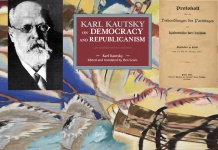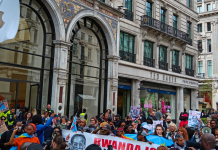
In December revolutionary reflections published a piece on the crisis in German politics today, which looked at the rise of the Alternativ für Deutschland and the challenges this poses for Die Linke. In this piece Loren Balhorn provides a response based on his experiences within Die Linke and German left politics.
I welcome Adam Blanden’s recent contribution on the strategic impasse of Die Linke, a party I have belonged to for nearly a decade. In this time, the party has appeared to stumble from minor victory to minor crisis, often driven more by contingency than any conscious strategy. Given both Germany’s dominance in the European Union and Die Linke’s leading role in the European Left, what happens here is of particular importance for anyone interested in reversing the effects of capitalist crisis and the resurgence of the populist Right on the continent, and it is paramount that the international Left take a stronger interest in the party and its fortunes to better understand the opportunities and pitfalls of Europe’s new Left parties.
The overall thrust of Adam’s argument – that the party “must neutralise right-wing nationalism by promising people renewed dignity through participation in democratic movements” – undoubtedly taps into a very real and serious problem, particularly given the well-documented collapse of public trust in democratic capitalist institutions and the European Left’s seeming inability to developed a strategy beyond them (the most obvious example being, of course, Syriza). A series of demoralizing defeats for our side over the last few years has been followed by the emergence of a new populist Right that, as Adam correctly identifies, has “often arisen where the left is stagnating or has disappeared as a functioning entity. Though the crisis is what has fuelled the populist right’s rise, the left’s relative weakness has left the way open for them.”
This is certainly true for Germany. After a brief political honeymoon in which the party polled between 10-15% and reached a peak of nearly 80,000 members, Die Linke has become a fixture of the political establishment in the eyes of many voters.[1] Although the party has recently done well in urban areas and among young people,[2] overall the AfD has definitively replaced Die Linke as the main protest party in the eyes of the working and middle classes.[3] The Left generally, and Die Linke specifically, will only remain politically relevant if it catalyses and mobilises the vast reservoirs of discontent that are simmering across Europe and channels them into a political movement that looks forward to new social and political horizons, rather than backwards to the ethnic nationalism and corporatism of the past.
The German Left’s response to the rise of the Right can be grouped into two poles: the first, embodied by Sahra Wagenknecht and rightly criticized by Adam, has sought to adopt some parts of the AfD’s rhetoric and win over some of its supporters for a “left-wing” programme. This has led to a series of unfortunate formulations on Wagenknecht’s part making concessions to xenophobia by blaming open borders for the December terrorist attack and the draining of the welfare state,[4] and have prompted ferocious (and, in my humble opinion, somewhat melodramatic) condemnations from sections of the Left. The second pole is represented by a campaign called Aufstehen gegen Rassismus (Stand up against Racism), a hastily-assembled coalition of some Die Linke branches and other Left groups, community organisations and sections of the trade union bureaucracy that many of us will probably recognise from other contexts.
In my opinion, neither of these responses is an adequate to the challenge of the AfD. Wagenknecht’s triangulation not only legitimizes xenophobia and thus racism (which the Left ought to oppose on principle), but also fails to polarize society around issues in a way that benefits us. Although Wagenknecht is simply trying to hold onto the millions of potential supporters who have confused and problematic opinions on some issues while supporting Die Linke on others (a basic sociological reality that many doctrinal purists tend to forget), she is helping to shift public discourse as a whole to the right and make the political terrain even more hostile for anti-racist and socialist politics. It may or may not help the party win a slightly better result in the upcoming elections, but it gives ground to our enemies and marginalizes our own ideas over the long term. It is short-sighted and opportunistic at best, irresponsible and potentially catastrophic at worst.
On the other hand, the purely defensive tactic of Aufstehen gegen Rassismus, necessarily a cross-party and cross-class campaign, is a well-intentioned but underdeveloped vehicle to confront the danger of the Right in today’s political climate. The campaign defines its goal as “drawing a red line”[5] between the AfD and the rest of society, i.e. enforcing the parameters of what is considered “acceptable” mainstream discourse against an insurgent xenophobia by stigmatising the AfD as an extremist and racist party. The campaign’s very mixed record thus far suggests that it will have trouble realizing this goal, but even if it does – what then? If the rise of right-populist and openly racist sentiment is due at least in part to widespread economic insecurity and feelings of political disenfranchisement, how does the radical Left change the narrative with cross-class demonstrations that allow the politicians responsible for the very climate feeding this racism to portray themselves as principled anti-racists? Particularly in a moment when the right-wing revival has occurred largely at the ballot box rather than on the streets, it is unclear to me how street mobilisations will reach the millions of German workers drifting towards the AfD who often live in economically depressed, geographically isolated areas which the campaign will not penetrate.
Admittedly, a tendency exists on some parts of the radical Left to write off these voters as hopelessly backwards and infected with nationalism – and certainly, some of them are. But a socialist strategy that seeks to win, i.e. overthrow capitalism and replace it with something better, has to unite a majority of the working class and the population at large. Now more than ever, anti-racism will constitute a significant plank of any successful socialist platform, but we will have to do a lot more work understanding the populist turn and developing our own version of it if we want to win back lost ground in the working class. Previous campaigns such as the Anti-Nazi League in the UK could build on a rooted and coherent sense of working-class identity and community structured around trade unions and workers’ parties. This old world of the industrial working class, although not dead, is greatly weakened and increasingly fragmented in our age. Rebuilding it – or rather, reinventing an infinitely more multi-cultural and diverse subaltern identity – is ultimately the only way to prevent more workers from falling for the Right’s false promises. This task will not be up to the Left alone, but we have an immensely important role to play in the process.
Given this background, and the fact that Adam and I generally agree on the diagnosis of the current situation in Germany, it is unfortunate that he devotes so little space to fleshing out what he actually means by “the precise role of the Party in mediating between the anti-democratic and authoritarian power of the state and the movements in society” – something he accuses Die Linke of failing to do, but does not really do himself. He is correct to argue that space for democratic participation in neoliberal institutions is significantly curtailed, forcing Die Linke to support decidedly non-progressive political measures when in power in the past. I also sympathise with his call to redefine a collective democratic subject on the Left’s terms as a potential response to this predicament, which both Wagenknecht and Aufstehen gegen Rassismus fail to do.
Yet what, practically, could constituting this democratic subject look like? Adam limits himself to one suggestion, namely that the –
job of a party like Die Linke is to take key democratic demands to the state at local and national level. And because Die Linke enters government not with a few social demands but as representatives of a movement for democracy, it has a clear right to withdraw from coalition governments when attempts are made to smother those demands, either by coalition partners or state institutions themselves. Die Linke must also open up key decisions to the public […]. These are not hypothetical concerns. A red-red-green coalition government beckons in Berlin. With Die Linke in power as a junior partner, it could be a rare opportunity to raise the profile of movements and to campaign for participatory, municipal forms of socialism.
Precisely such a situation has emerged since the publication of Adam’s article in the form of the scandal around left-wing geographer Andrej Holm. He was briefly appointed State Secretary of Housing in Berlin’s new centre-left coalition before controversies around his very short teenage career in the East German secret police led to his sacking earlier this month. In many ways, the event has been symptomatic of Die Linke’s political impasse: the party campaigned primarily on the promise to make housing more affordable, yet the final coalition agreement contained significantly less social housing construction than Die Linke had originally demanded. Arguably as a kind of symbolic fig leaf to its disappointed base, the party then proposed Holm, a well-known and beloved figure on Berlin’s Left, as State Secretary. Holm’s enthusiastic reception was cut short, however, by allegations that he lied to his university employer about his brief period in the Stasi, and attempts to rally a campaign around him largely failed. The incident ended when Berlin’s Social Democratic mayor Michael Müller removed Holm from his post without even informing Die Linke’s Berlin leadership of the decision beforehand.[6] At this point, it appears that the party will do nothing to further defend Holm beyond some perfunctory statements of disappointment and appeals to its base to “keep up the fight”, although for or against what exactly is unclear.
I am sceptical that Die Linke would have had much success withdrawing from this government or conducting a plebiscite with its supporters as Adam would presumably advocate. The problems are manifold: firstly, Die Linke is no position to campaign for “municipal socialism”. Although the national leadership features quite a few far-left figures, the leading bodies of the party at the state level are often filled with established politicians committed to taking power through the ballot box, particularly in Berlin and the other Eastern states. Even where the party is led by the more radically-inclined, they lack a plausible strategic alternative, and processes of institutionalization continue apace. As Die Linke politicians accrue offices, staffs, and stable, well-paying jobs in the parliament or the party apparatus, they gradually develop vested interests in maintaining business as usual. This is not because they are bad people or because they are betraying the movement, but because of the internal logic of parliamentary democracy which, absent massive countervailing forces from below, eventually subsumes those who participate in it. As neither a mass movement nor a socialist revolution appears likely anytime soon, even politicians on the party’s left wing (like Wagenknecht) will inevitably move towards an electoral approach. That the activist base of the party has dwindled substantially over the last decade, making the party increasingly top-heavy and bureaucracy-driven, only amplifies this problem.
Secondly, there simply is no “democratic movement” to which Die Linke can relate the way Adam describes. Although Berlin is the veritable capital city of the German radical Left, attempts to build a campaign for Holm beyond the usual suspects of radicalized students and various flavours of anarchists failed. Some resistance has flared up at the Humboldt University where Holm teaches, but it is far from the kind of manifestation necessary to win this fight, and has occurred without Die Linke’s involvement. Granted, Adam does insert the caveat that “whether or not Die Linke is in the right shape to pursue such radical strategies should not deter us from demanding this and more”, but I fail to see what that accomplishes or even means in this context. The revival of social movements will be an essential precondition to any revival of Die Linke beyond temporary electoral gains, but this revival cannot be accomplished by the party itself. Die Linke today has roughly 60,000 members, the overwhelming majority of whom are over 40, while the large base of aging members in the East gives the party a formal size not reflective of its strength on the ground. This is not to write the party off, but simply to point out the limitations it faces.
Over the long term, reconstituting a kind of militant democratic subject strikes me as a useful meta-formulation for thinking about anti-capitalist coalition- and movement-building in the 21st century – to the extent that it means uniting socialist demands with a vision of a fuller and more inclusive democracy, rather than abandoning economics in favour of a kind of libertarian austerity, as the German Greens have done. Yet to get there, the Left is going to have find a couple of issues with which it can drive a wedge into the popular debate and polarize society along our terms. Adam concludes by arguing that “democracy is the precondition to social justice”, which to him means that Die Linke must re-claim the anaemic neoliberal democracy that is modern Germany before it can successfully win social justice reforms. In my opinion, things are actually the other way around. What the party can do in its current state is use the public platform provided by parliament to polarize German society around issues that benefit our side: economic inequality, privatization, women’s rights, universal childcare, etc. Arguably, the better they do this, the more openings emerge in which the party (and the movements more generally) can intervene and win layers over to our side and (hopefully) make a qualitative leap forward in political and organisational terms.
As the Right forms a new popular subjectivity by referring to notions of ethnic and racial community and appealing to an idealized ethnically homogenous past, the Left will have to do the same on its own terms. Historically, these have been social issues and class issues. At the risk of sounding like an economic reductionist, the Left will only be able to become relevant if it manages to accelerate social polarization around questions of economic inequality, amplified by a sensitivity towards the ways that race, gender, and other factors mediate and structure this inequality. Particularly in a country like Germany, which in the European context must be viewed as a kind of “oppressor nation” in relation to Greece and the rest of the South, I would be reluctant to indulge in some sort of broader, cross-class subjectivity as an alternative to building class power in the way that Panagiotis Sotiris does for the Greek context.
A popular critique of the neoliberal state and the development of a collective narrative feeding into the constitution of a militant democratic subject could potentially (and indeed hopefully) occur in the course of social polarization, and it is no doubt the task of radicals of all stripes to work towards this, but whether that will happen primarily through an increasingly bureaucratised and politically malleable Die Linke strikes me as doubtful. The formation of Die Linke remains the most important development on the German Left in a generation, and the party will have an important role to play in coming struggles, but radicals in general and revolutionary socialists in particular, would be well-advised to keep its limitations in mind when formulating strategy or speculating on future developments.
Ultimately, the long-term goal of cohering an anti-capitalist, anti-racist mass movement rooted in the working classes is a monumental project that neither Die Linke nor the splintered fragments of the radical Left will be able to fulfil on their own. Accordingly, socialists should approach politics with the open-mindedness necessary to understand and respond to new developments – something that I think Adam has helped to do with his contribution.
[1] https://www.jacobinmag.com/2016/06/die-linke-germany-left-refugees-merkel-socialists/
[2] https://www.jacobinmag.com/2016/09/berlin-elections-die-linke-afd-merkel-cdu-spd/
[3] https://www.jacobinmag.com/2016/09/germany-die-linke-afd-xenophobia-right-merkel/
[4] http://www.dw.com/en/echoing-the-afd-left-partys-wagenknecht-says-merkel-partly-to-blame-for-berlin-terror/a-37042339
[5] https://www.aufstehen-gegen-rassismus.de/kampagne/rote-linie/
[6] http://www.independent.co.uk/news/world/europe/berlin-housing-secretary-andrej-holm-fired-sacked-stasi-michael-muller-gentrification-urban-a7528611.html



















